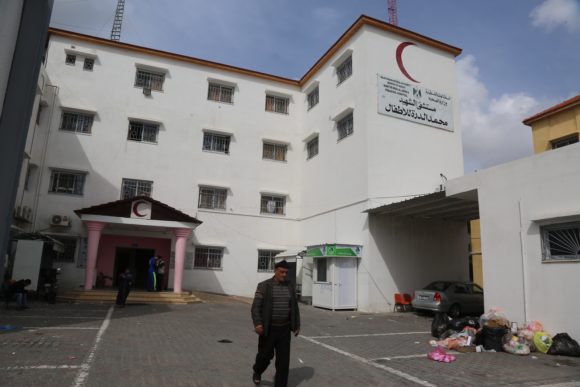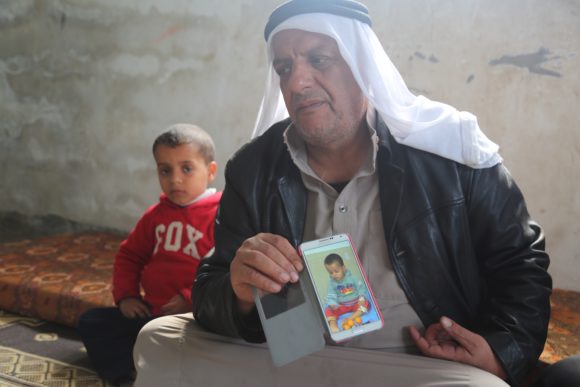Signs of a serious financial and medical crisis are everywhere at Durrah Children’s Hospital in Gaza City.
Dirt and dust have been collecting on the staircases since cleaning staff went on strike ten days ago, as they haven’t been paid for the fifth month in a row. Its hallways are dark because fuel supplies are depleted, and the generator no longer runs.
Three-year old Hamza Sakar lies on a bed in one of the crowded rooms while his grandma holds up a nebulizer to his nose to help him breathe. He is just one out of many Palestinians at risk of dying due to a lack of medication and treatment.
“If he receives a life-threatening infection, he will die,” said Dr. Essam Garably, director of the hospital. “All patients are at a risk of infection, even those who come to the emergency department to use the nebulizer.”
Children with contagious diseases have no choice but to stay in overcrowded rooms, posing a high risk for illnesses to spread.

Garbage collects in the courtyard of Durrah Children’s Hospital in Gaza City. Cleaning staff have been on strike since they haven’t been paid for five months. (Photo: Mersiha Gadzo)
Three weeks ago Durrah hospital shut down its intensive care unit and combined three of its departments into one in order to make the most out of the limited allocation of electricity, just four hours a day.
Gaza has been struggling with an unprecedented medical crisis since the end of January. Around 45 percent of essential drugs are at zero stock while 16 medical centers and three hospitals in Gaza have shut down their services as they don’t have enough fuel to keep the generators running.
The Ramallah-based Palestinian Authority (PA) is responsible for the purchase of medications sent to Gaza, but fails to do so regularly.
Since Sakar is immune deficient, his life depends on consuming IGIV (Immune Globulin Intravenous), which contains antibodies to fight bacteria, fungi and viruses. But Gaza hasn’t received any in the last six months.
Due to the lack of IGIV, Sakar caught severe pneumonia in the last two months. Fluid accumulated above his lung, sending him into a septic shock. During surgery, doctors inserted tubes into his left chest, where they successfully drained the fluid and gave him medication to maintain his blood pressure. He managed to recover, but with the IGIV he wouldn’t need to go through this ordeal.
“Sometimes they send from Ramallah ten grams [of IGIV] but Gaza’s hospitals need 300g per month. We haven’t received a single gram,” Garably said, “Last time [about a month ago] Ramallah sent 750 boxes of medication. 450 of them consisted of fluid- the cheapest [medication]. Each one costs two shekels.”
“For chronic diseases, emergency cases such as epilepsy, immune deficiency, cardiovascular disease, chemotherapy- they didn’t send even one tablet,” Garably went on.
“They told the media, ‘We are sending a lot of medication to Gaza’, but look at the quality,”
Six premature infants have reportedly died since the start of 2018 due to a lack of respiratory medication that helps them to breathe normally. The lives of another 113 are at risk, according to Gaza’s ministry of health.
Last summer the PA made headlines when it stopped issuing medical referrals for treatment outside of Gaza which ended in the deaths of many newborn babies. The denied permits were seen as a measure of pressure to force Hamas to relinquish control.
Hamas announced last fall they were relinquishing control of the Gaza Strip in an attempt to reconcile with Fatah and to end the crushing sanctions. However, the deal has been fruitless thus far; sanctions by the PA continue.
According to Tareq Baconi, an analyst at al-Shabaka, the Palestinian policy network, the PA is still maintaining pressure on Hamas until it completely relinquishes control of its security sector, which it so far has been unwilling to do.
“For the Palestinian Authority, that continues to remain unacceptable and from their perspective, they’ve been using Palestinians in Gaza as political pawns by increasing the suffering, by increasing pressure on Hamas’ government,” Baconi said.
“This is a very cynical attempt by the Palestinian Authority and it’s absolutely morally repugnant that they could use the livelihood of two million Palestinians in Gaza as political pawns to pressure Hamas whether or not they believe they are justified,” he said. “There should be a government for all the Palestinian people in the Gaza Strip and the West Bank. What it’s doing is it’s buying into the divisions that the Israeli occupation is trying to institutionalize in the Palestinian territories.”

In Deir al-Balah, Muhammad Abu Amra shows a photo of his grandson Ahmad Abu Amra, who died waiting for his medical referral to be approved. His brother looks on in the background. (Photo: Mersiha Gadzo)

Ahmad Abu Amra’s father, Khaled Abu Amra, shows another photo of his son. (Photo: Mersiha Gadzo)
Rejected and delayed permits
Garably submitted an urgent referral report for Sakar to undergo a bone marrow transplant outside of Gaza and to receive his monthly IGIV, but the PA rejected his application.
“The last six months have been very difficult,” Garably said. “It’s a political problem.”
Three-year old Ahmad Abu Amra from Deir al-Balah, Gaza died on January 27, 2018 while waiting for an exit permit to be approved as he suffered from internal bleeding in the head. Despite submitting an urgent transfer application, his family waited three weeks and received the approved permit a day after he died. All permits to leave Gaza for treatment in Israel must first be approved by the Palestinian Authority. Leaders in Gaza accused Ramallah of delaying and out-right refusing to turn over the requests to Israel.
“I wish someone could investigate his case and hold to account the person who is responsible for transferring patients,” said Muhammad Abu Amra, Ahmad’s grandfather.
“Here in Gaza, we live in difficult conditions. It’s unbelievable that it took 20 days to transfer him from one hospital to another.”
Two months ago Ahmad underwent a successful surgery in Ramallah, in which doctors removed the cancer in his head. But 20 days after returning home, doctors in Gaza discovered fluid in his head and conducted another surgery where they inserted pipes to drain it.
This turned out to be a serious mistake, as his family later found out. After the surgery, Ahmad’s head began to bleed internally which required urgent surgery, unavailable in Gaza.
The family spent one week frantically emailing, trying to contact hospitals in Ramallah, but all of them refused, saying they could not correct mistakes made by doctors in Gaza.
To visit a hospital in Israel, they were also waiting on a permit, but it came too late.
Due to decade-long Israeli-Egyptian siege, Gaza doesn’t have adequate resources to provide proper treatment and surgical skills and medical expertise have been frozen in time.
Patients in Gaza have been left abandoned, unable to receive treatment in Gaza and unable to receive treatment in Israel or the occupied West Bank due to denied or delayed permits.
Israel as an occupying force is obligated under international humanitarian law to ensure the Palestinian population’s access to medical treatment and to maintain its medical facilities, hospitals and services in the occupied territories.
However, in 2017, 54 Palestinians from Gaza died while waiting for Israel to issue their exit permits in order to receive treatment abroad. Forty-six percent of all permits were denied or delayed in 2017–a record-low rate.

Ahmad Hanadi, around 18 months old, before he fell ill. (Photo courtesy of the family of Ahmad Hanadi).

Yasmine Hanadi soothes her son Ahmad Hanadi. (Photo: Mersiha Gadzo)

Ahmad Hanadi. (Photo: Mersiha Gadzo)
At Nasser hospital in Khan Younis, southern Gaza, six-year-old Ahmad Hanadi cries in pain. He suffers from a severe type of skin sclerosis–it’s the only case in Gaza and the seventh case in the world.
“There’s something in his chest,” his mother Yasmine Hanadi explained, while she propped Ahmad on his side like a doll, as he can no longer move his joints.
After analyzing his skin in Jerusalem, doctors discovered that he most likely developed the disease by inhaling toxic fumes caused by the Israeli military assault on the Gaza Strip in 2012.
Born on the first day of the eight-day assault, the Hanadi family lives on farmland in the outskirts of Khan Younis. In these open areas, one can easily breathe in the toxic fumes, Yasmine explained.
They need to visit a hospital in Jerusalem for treatment in early March and so the specialist can conduct further tests and transfer the information to the U.S. to be analyzed since his case is especially rare.
But Israel has denied their exit permit three times in the last three months. They have applied again and are also waiting for a medical permit from the PA. However, Yasmine doubts that the PA will provide them financial cover since they have said in the past that his case is too expensive.
“The PA doesn’t even recognize us as Palestinians to help us,” Yasmine said.
“Ahmad has the right to receive treatment and to recover. I will be grateful for any support that we can get.”
Source Article from http://mondoweiss.net/2018/02/premature-infants-medication/
Related posts:
Views: 0
 RSS Feed
RSS Feed

















 February 22nd, 2018
February 22nd, 2018  Awake Goy
Awake Goy  Posted in
Posted in  Tags:
Tags: 
















